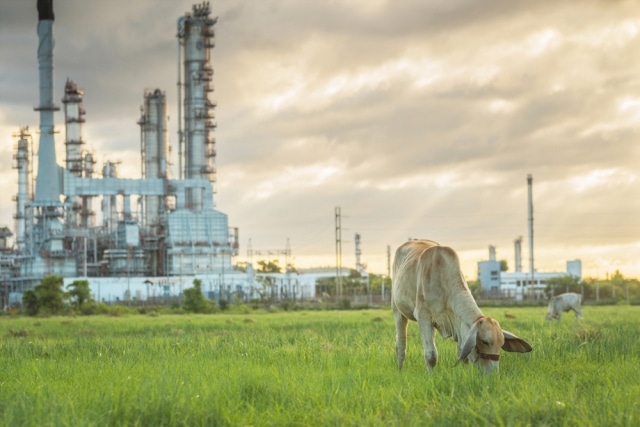Last month, Terry Greenwood, a Pennsylvania farmer whose water had been contaminated by fracking waste, died of cancer. He was 66 and the cause of death was a rare form of brain cancer.
His death drew attention from around the globe in part because Mr. Greenwood was among the first farmers from his state to speak out against the gas industry during the early years of the state’s shale gas rush.
Mr. Greenwood went up against a company called Dominion Energy, which had drilled and fracked a shallow well on his small cattle ranch property under a lease signed by a prior owner in 1921.
In January, 2008, Mr. Greenwood had reported to state officials that his water supplies had turned brown and the water tasted salty. The Pennsylvania Department of Environmental Protection subsequently found that the company, whose gas well was drilled 400 feet from the Greenwoods’ water well in 2007, had impacted the Greenwoods’ water. State officials ordered Dominion to temporarily supply the family with drinking water.
Mr. Greenwood’s death was mourned by environmentalists around the world. In London, for example, attendees at a fracking education event recorded video messages for the Greenwood family and raised over $500 for Terry’s survivors.
“Terry Greenwood was one of the most compelling people you could ever listen to,” wrote filmmaker Josh Fox. “There was just something about the way he spoke, there was a decency and a positivity that shone through every word no matter how distressing or disturbing the subject matter was.”
But the story of Mr. Greenwood’s fight against the drilling industry and lax oversight by state regulators does not stop there.
In the weeks since his death, there has been a steady stream of further revelations about ineptitude by state environmental and health officials in protecting the public from the type of threats that may have killed Mr. Greenwood. These revelations are both a reminder of the importance of Mr. Greenwood’s fight and a reiteration of how little has changed.
Last week, Dr. Eli Avila, formerly Pennsylvania’s health secretary, made headlines when he told the Associated Press that the state had neglected health impact studies.
“The lack of any action speaks volumes,” Dr. Avila, now Orange County, New York’s public health commissioner, told the AP. His perspective was shared by other health experts. “Pennsylvania is ‘simply not doing’ serious studies into possible health impacts of drilling, Dr. Bernard Goldstein, who has five decades of public health experience at hospitals and universities in New York, New Jersey, and Pennsylvania” said, the AP reported.
The lack of oversight and transparency has been endemic to Pennsylvania and its handling of fracking.
In 2011, Governor Tom Corbett’s Marcellus Shale Advisory Commission recommended that the state begin tracking health effects, through a registry that would monitor the health of people living within a mile of natural gas drilling or production sites, like well pads and compressor stations. The Commission called for “the timely and thorough investigation of and response to concerns and complaints raised by citizens, health care providers or public officials.”
But funding for the initiative — including $2 million originally included in the state’s key drilling law, Act 13 — never materialized.
Meanwhile, requests for information about health risks from state officials often seem to hit a brick wall. In response, local organizers have resorted to published lists of hundreds of state residents who say that they’ve been harmed by the drilling rush.
This official silence comes against a larger backdrop of stonewalling. Retired state health officials recently alleged that the Department of Public Health barred them returning phone calls from residents with potentially fracking-related concerns and had circulated a list of buzzwords that might indicate a call was related to the shale drilling frenzy.
“We were absolutely not allowed to talk to them,” Tammi Stuck, who worked as a Fayette County community health nurse for nearly four decades, told StateImpact.
The state initially denied that a list of buzzwords existed. But after StateImpact obtained copies of the buzzword list, the agency confirmed that the documents were authentic, changing its story to say that their goal was not to suppress complaints but to ensure “that we are speaking with one voice.” Although state officials are supposed to coordinate between agencies to handle residents’ concerns, locals described a frustrating process in which complaints were bounced from agency to agency.
Farmers have for several years said that, for all that is not known about fracking, one thing is certain: livestock are being affected. Mr. Greenwood knew this peril first hand.
“They was drilling and all the water was running into the field and the cattle was up there right in their pasture drinking the water,” Terry Greenwood told Josh Fox in footage from roughly 2009 that the filmmaker released as part of a video memorial. “And I called DEP and I says ‘they [the cows] shouldn’t be drinking that water,’ I said, ‘what’s in that water?’ Cause I didn’t know nothing about all this at first, and they said ‘there’s nothing wrong with it.’ My cows started having calves, there was 18 cows. Calves was starting to die. You know, 18 cows that were having calves, I lost 10 of them.”
“So what did DEP say?” Mr. Fox asked, referring to the state Department of Environmental Protection. “’That’s a farmer’s luck,’” Mr. Greenwood replied.
The DEP later attributed the deaths to e coli bacteria in the pond, but Mr. Greenwood remained skeptical that bacteria was the true cause of the deaths. “”I said, ‘Them cows have been drinking out of that pond for 18 years and I never had this problem before,’” Mr. Greenwood told a local newspaper in 2010.
And the following year, things got worse. In 2011, not a single one of the Greenwoods’ thirteen remaining cows gave birth to a live calf, Mr. Greenwood later said.
The symptoms Mr. Greenwood reported in his cows seem generally consistent with incidents tied to fracking wastewater across the country. Animals like cows and deer are particularly drawn towards drinking the toxic wastewater that flows back from natural gas wells after fracking because of the water’s salty taste.
“Cattle that have been exposed to wastewater (flowback and/or produced water) or affected well or pond water may have trouble breeding,” veterinarian Michelle Bamberger and Cornell Professor Robert Oswalt wrote in a 2012 peer-reviewed paper. “Of the seven cattle farms studied in the most detail, 50 percent of the herd, on average, was affected by death and failure of survivors to breed.”
Scientists have called for greater attention to the effects on animals from drilling and fracking, saying that animal health could serve as warnings for effects on human health.
“As part of an effort to obtain public health data, we believe that particular attention must be paid to companion animals, livestock, and wildlife, as they may serve as sentinels for human exposures, with shorter lifetimes and more opportunity for data collection from necropsies,” Drs. Bamberger and Oswald wrote.
No one can say for sure whether fracking chemicals killed Mr. Greenwood or his animals. But advocates say that they have a right to know and they say one of their biggest frustrations is the state’s silence on the matter.
But the lack of public health information has advocates calling for a full investigation into the state’s investigatory failures.
“The legitimate questions of Pennsylvania citizens concerning their health or that of family members as a result of natural gas drilling activity cannot be discounted or dismissed outright,” a statement signed by five of the state’s leading environmental groups said last week. “The fact that the [D]epartment [of Environmental Protection] originally denied the existence of a “buzzwords” list, and the fact that Gov. Corbett has refused to weigh in with a forceful response, leaves us no choice but to call for a full investigation.”
Friends said Mr. Greenwood was one of the first people to speak out against the shale gas drilling rush in Pennsylvania and had made the phrase “water is more important than gas” his personal motto following his experiences with the shale gas industry.
“We had two springs, a well for drinking, and a pond,” Mr. Greenwood explained to film-maker Josh Fox in a video filmed roughly five years ago that Mr. Fox released as a memorial in June.
“The pond’s no good, the well ain’t fit to drink, original well’s gone and the spring for the cattle is gone. There’s a little spring for the house and that’s all that’s left on this property.”
“So I have a farm, and it’s useless,” he added. “When they take this water buffalo, or whatever happens to this water buffalo, I don’t know what’s gonna happen.”
Photo Credit: Cow Grazing at Oil Refinery factory, via Shutterstock.
Subscribe to our newsletter
Stay up to date with DeSmog news and alerts






